Croatian Company Microblink Boasts World Class Platform, Attracts Investors
January the 13th, 2021 - Croatian companies are becoming more and more recognised and respected across the world, and the Croatian company Microblink, headquartered in Zagreb, is just one of them.
As Poslovni Dnevnik/Lucija Spiljak writes, the end of a series of successes of Croatian technology companies in 2020 was made by the roatian company Microblink with the investment of the Boston investment company Silversmith Capital Partners, which invested 60 million US dollars in Microblink for a minority stake, making the domestic company's market valuation exceed one billion kuna.
Microblink is a world leader in the field of computer vision based on artificial intelligence (AI), and many applications use its technology to use a mobile phone camera to replace manual data entry.
Their software products are used by several hundred million users in about 70 countries. In 2020, despite the coronavirus crisis, the Croatian company Microblink ended with a 36% increase in sales revenue with an increase in the number of employees, which now numbers more than 100, and with a new investment board with Sri Rao, a Silversmith partner, and Darren Bassman, co-founder of BlinkReceipt, who became the CEO of Microblink.
''The Microblink technology platform enables intelligent use of computer vision such as account scanning (BlinkReceipt), personal documents (BlinkID) and payment data (BlinkCard). BlinkReceipt extracts and identifies data at the level of the SKU (Central Control Unit) from the real-time accounts of hundreds of traders and millions of SKUs. There's a huge opportunity in this category and we're going to continue to invest in it,'' said Darren Bassman.
As this is the first time that external capital has entered Microblink, and for Silversmith it was the first time they invested in a Croatian company, the general partner in Silversmith, now a member of the Board of Microblink, Sri Rao, revealed to what the plans going forward are.
Why Microblink?
Microblink has brought together one of the world’s leading technology teams focused on data science and computer vision. This talented group has developed a platform that unlocks real-world AI and machine learning applications that are now used by hundreds of millions of end users, who collectively scan billions of documents each year to save time and money. The company is addressing a large, growing market and we look forward to working with a team that continues to develop customer-focused products that solve problems for companies in a variety of industries.
What benefits does partnering with Silversmith Capital Partners bring to Microblink?
Silversmith is focused on partnering with profitable companies like Microblink with high growth, run by their founders. Focusing on products focused on product growth as a market entry strategy allows us to leverage our experience and our networks as a complement to the management teams we support. Microblink has built a world-class engineering organisation and technology platform, and the partnership with Silversmith will help the company accelerate growth in key business areas, including product development, market entry and team expansion. We're long-term oriented investors and will work with the company to invest in a team, product and market-going organisation to enable sustainable growth in the future.
After the partnership with the Croatian company Microblink, will you start a deeper study of the Croatian IT scene, considering that Microblink is the first Croatian IT company in which you have invested?
We're always looking for exciting growing companies with market leading products in our key areas of focus. We're also discovering that there are more and more of them outside of the Silicon Valley, and this is a trend we have long believed in. We enjoy discovering great talents on the Croatian technology scene.
You state that Silversmith’s mission is to partner and support the best entrepreneurs in growing, profitable technology and healthcare companies. We've seen that technology, ie digitalisation and digital transformation, and healthcare are the most important industries, which in 2020 experienced additional growth due to the global crisis. How has this crisis affected Silversmith, this investment and results?
2020 was certainly a unique and challenging year on so many levels. In response to the crisis, there has been an acceleration of digital transformation around the world. What would take years to move, happened in a mere few months. We've seen this through the prism of our portfolio companies. Some of them were already remote organisations, and others had to move out of the office, while taking care of the health and safety of their teams. The profitable nature of these companies has allowed them to weather the storm, and the need for digital solutions due to the pandemic has allowed some companies to accelerate their growth.
Technology and health will continue to serve as key components of economic recovery even after the end of the pandemic. Our focus on growing, profitable companies means that every business is well positioned to address new opportunities. Across the portfolio in 2020, we saw 43 completed acquisitions, a 20 percent increase in employees, a 30 percent increase in average income, and four investment exits (full and partial).
How many professional investors do you gather together? How much has Silversmith collected since its founding back in 2015?
We have 22 professional investors. Since its inception, we have raised 460 million US dollars in the first fund in 2015, 670 million dollars in the second in 2018, and 880 million dollars in 2020. In the last five years, we've invested in 27 companies in the technology and health segment, with an emphasis primarily placed on supporting long-term growth.
What are the goals and plans for 2021?
Our goals for 2021 will be similar to those at the time the company was founded - finding and partnering with the best entrepreneurs in the technology and healthcare sector and working with them to expand and develop their business.
For the latest travel info, bookmark our main travel info article, which is updated daily.
Read the Croatian Travel Update in your language - now available in 24 languages.
National AI Capital: How to Grasp Current Status of a Country & Estimate Its Potential?
December 11, 2020 - Aco Momcilovic continues his national AI capital journey - how to grasp the current status of a company and estimate its potential?
As a result of an NAIC Initial Global Survey, the final definition was fine-tuned based on the inputs from 200+ AI experts from around the world (56 countries). Elaboration of the definition is available in this article.
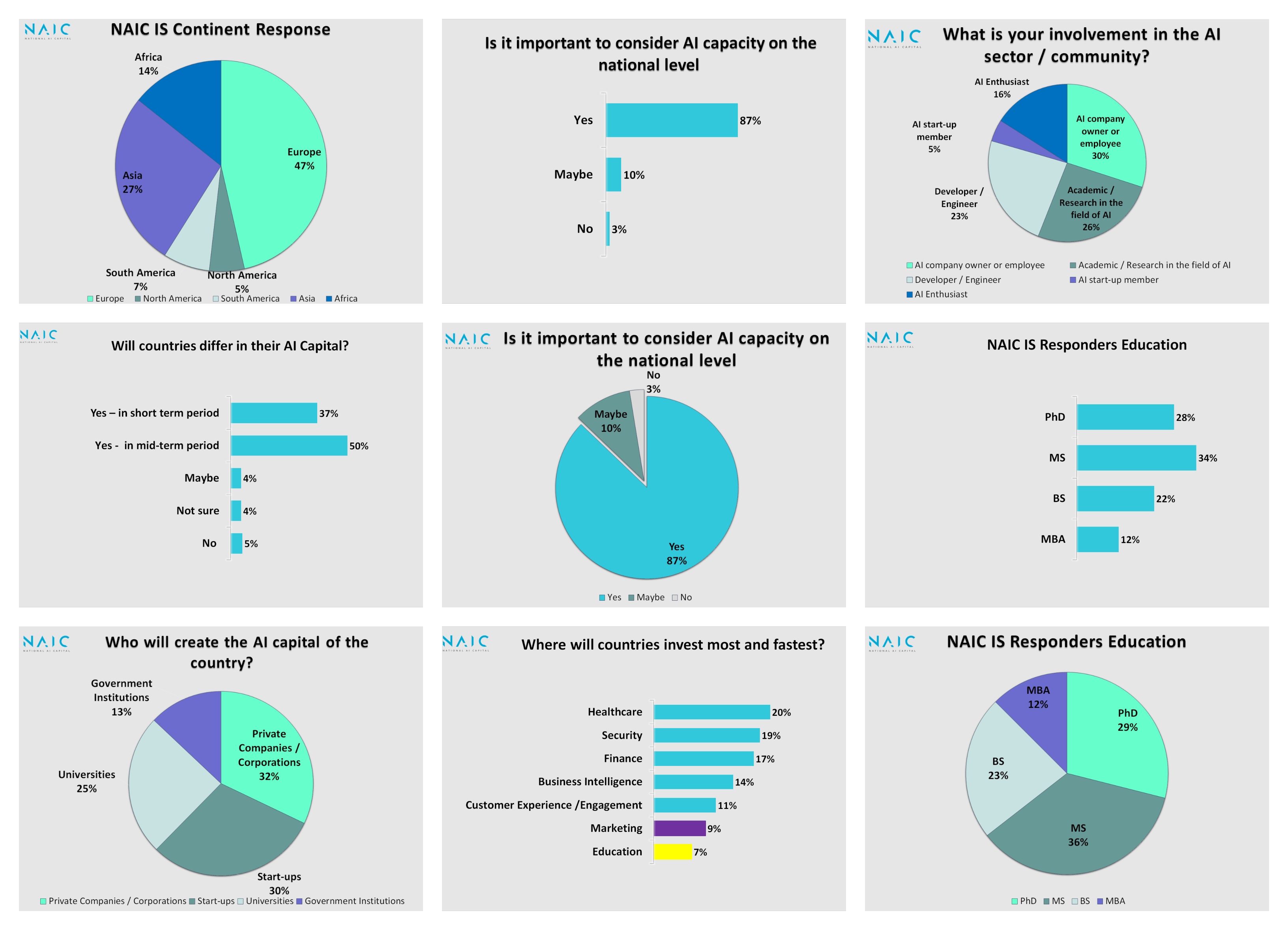
The proposed methodology was also fine-tuned and completed to form a dynamic set of factors that will be assessed for each country/ unit of measurement.
But before we describe the methodology itself, let's return to WHY are we doing this? What is the importance of the National AI Capital?
Why?
“If we don’t act now we don’t have a future” is the sentence I heard in different forms, at many conferences, and meetups and discussions in recent years. People working in the AI field are warning us about it. As some results of NAIC IGS showed us, the development of AI could be a great differentiator between countries or a great equalizer. But we need to act now.
To quote Erik Brynjolfsson, director of the MIT Initiative on the Digital Economy: “This is a moment of choice and opportunity. It could be the best 10 years ahead of us that we have ever had in human history or one of the worst because we have more power than we have ever had before.”
Artificial intelligence could be general-purpose technology, one of those who changed the history of the world. GPTs are best described by economists as “changes that transform both household life and the ways in which firms conduct business.” The four most important GPTs of the last two centuries were the steam engine, electric power, information technology (IT), and possibly artificial intelligence (AI).
NAIC Methodology
The methodology is proposing that NAIC will have 5 dimensions and 15 factors in total to be assessed and included in the final score and profile. The last one – is a dynamic one and can partially differ from country to country based on their specifics.
5 Dimensions in a Dynamic Model
D1 Human Capital / Talent Dimension
D2 Government / Politics Dimension
D3 Private Sector Dimension
D4 Academic / Research Dimension
D5 Specific / Additional Dimension
In those 5 dimensions, we have 15 factors and each of them is defined more precisely and could include some sub-segments.
Human Capital / Talent Dimension
1 Number of engineers/developers working in the field
2 Number of engineers/developers dealing with related fields
3 Number of non-engineering talent working in the field of AI
Government / Politics Dimension
4 The national long term AI vision and strategy
5 Legal frameworks for AI
6 Number of national AI development projects
7 Number of AI system implementations at the state level
8 The amount of data collected and structured that can be used to develop AI
Private Sector Dimension
9 Corporation/Private firms
10 Number of AI start-ups
Academic / Research Dimension
11 Amount of scientific/research papers/ number of patents
12 Connection of AI scene with the world community and knowledge exchange
Specific / Additional Dimension
General Distinctive | Country-Specific |
13 Combined national super-computing power dedicated to AI projects
14 Specific capacities (example: the ability to produce AI-specific hardware)
15 Percentage (%) of jobs substituted by AI and automatization
Consequences
If countries raise awareness about their National AI Capital, if they make and implement mid-term vision and strategies, and if they work on the improvement of their NAIC profiles many positive changes will happen.
One possibility if countries react on time and in a proper manner, (or only for those who do that), is to achieve the level of AI development where the widespread availability and low prices of AI will make it more of a utility like electricity or water, versus a competitive differentiator.
And those with a high NAIC Index will as a consequence increase the country’s/citizens' social and economic well-being and national competitiveness in a sustainable manner as stated in our definition.
Conclusion
The second phase of data gathering and exploration will start soon, together with many institutional partners.
Even at this moment, there are different groups of students working on some parts of methodology, and gathering and processing data while working on the NAIC Student Project, created for the specific purpose of cooperation with universities. The number of Universities that are participating is growing every month. Special thanks to the first 5 of them:
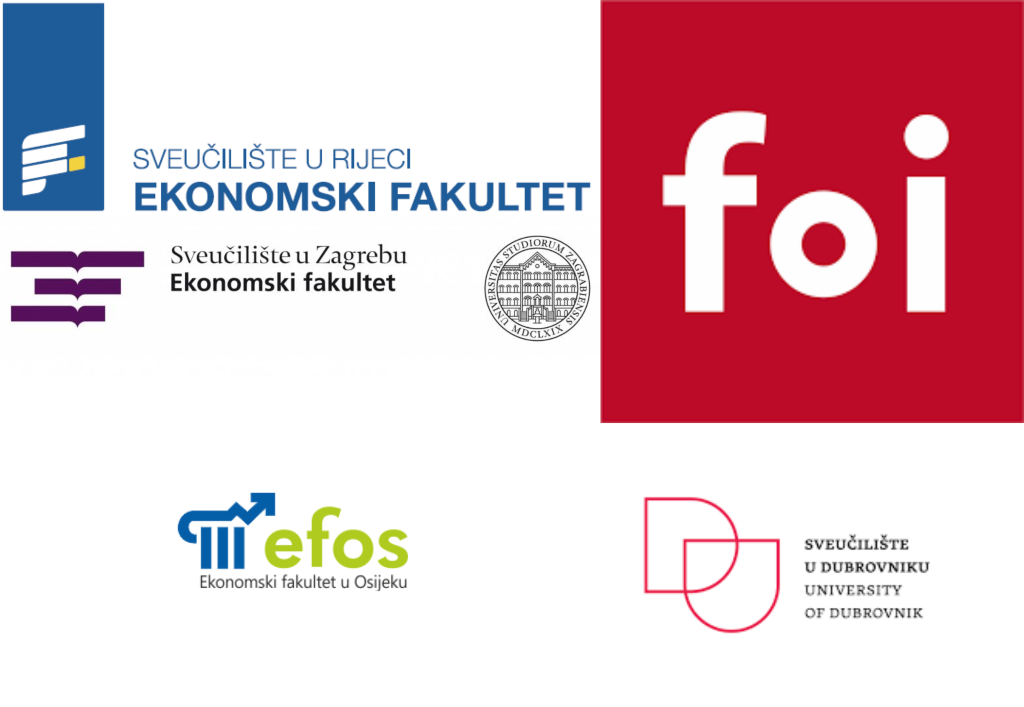
COOPERATION: For the second phase we will enlarge the number of
academic institutions,
AI/tech associations,
companies that are willing to sponsor/participate and contribute
media who will become partners will get new data and articles first
If you are interested in collaboration, in any of those segments — contact me on
This email address is being protected from spambots. You need JavaScript enabled to view it.
Donations
If you want to support further this project and share your enthusiasm, be free to donate symbolic amounts of Ethereum (ETH) to this address: 0x29e574B5A65e1d7De2B177b53996A26A6729514F
To learn more about this topic, please check Aco's profile on Medium.com.
For the latest travel info, bookmark our main travel info article, which is updated daily.
Read the Croatian Travel Update in your language - now available in 24 languages.
Serengeti: One of Biggest Croatian Developer Companies to Develop AI
As Poslovni Dnevnik writes on the 9th of October, 2020, Serengeti, a Croatian consulting company that provides enterprise solution development services and is one of the largest such developer companies in Croatia, and Besplay Adria, a Zagreb-based startup that developed the RedAI application, recently signed a contract by which Serengeti becomes a co-owner of RedAI application. In addition, a collaboration with Tricentis, which has been recognised as a leader in automated testing by Gartner, Forrester and IDC, has been announced.
"By partnering with Besplay Adria, ie the co-ownership in the RedAI application, which is based on the application of advanced machine learning technologies and artificial intelligence, we've made a step forward into a new, attractive area. In addition, by including the RedAI application in our portfolio, we've entered the retail industry, which is recording its latest boom thanks to the application of innovative software solutions that allow both small and large players on this competitive market to be as agile as possible,'' commented Serengeti's CEO Goran Kalanj. He added "Serengeti has long been present on the market as a reliable partner for automated software testing, and cooperation with the world leader in this field, Tricentris, further confirms this and gives us the opportunity to apply our knowledge and best practices in this area in terms of further development and functionality of the software testing solution,''
"We're extremely pleased to be able to start a business synergy with Serengeti, which is established here on the Croatian market as one of the leading IT companies. Considering that the RedAI solution is also 100% made in Croatia, we're glad that in the future two Croatian companies will try to position RedAI commercially outside of our own borders, as well as continuously technologically improve the solution in the years ahead. FMCG/CPG is the primary industry where RedAI has proven to be a "must have" product for leading companies within the industry, but our goal is to offer complementary digital solutions in other industry niches and improve their business,'' said Domagoj Borsic, CEO of Besplay Adria.
''RedAI is an application that delivers current results on your device in correlation with your predefined KPIs. The user photographs the shelf or refrigerator with a mobile device or tablet with simple guidelines built into the app. AI software detects, processes and classifies each SKU previously defined by the client and delivers results to the user on site, as well as the management team, and compares compliance with established KPIs or contract terms with individual retailers,'' the director of Besplay Adria explained.
2020, although marked by the ongoing coronavirus crisis, is the year in which Croatia's Serengeti started a number of new projects on both the Croatian and foreign markets. In the retail industry it accelerated the implementation of advanced solutions. Numerous clients on foreign markets are the best proof of Serengeti's domain knowledge and the name of the company is known in the countries of Western Europe.
By taking over part of the ownership in the RedAI application, Serengeti has become an exclusive partner of Besplay Adria and will support this startup company in the further development of the application as well as its presentation in foreign markets. It is an application that uses artificial intelligence technology and is used by sales representatives to improve the sale of consumer goods. Thanks to this innovative solution, sales representatives can analyse a shelf in a shopping centre as well as products in refrigerators in the HoReCa sector in just a few seconds. The next step in the development of the application is 3D mapping of products within the application, which requires the further application of advanced and modern technologies.
Smart software testing is the next step in the field of automated testing where Serengeti will work with Tricentris in a way that their consultants will strengthen the existing team and develop new functionalities towards smart software testing solutions. Tricentris is a globally recognised company that has been at the very top of the software testing industry for several years in a row now, according to independent research. Their solution encompasses the entire process of testing software functionality from an end-user perspective.
For the latest travel info, bookmark our main travel info article, which is updated daily.
Read the Croatian Travel Update in your language - now available in 24 languages
NAIC Part 2 of Initial Global Survey: Will (Uneven) Development of AI a Cause Even Bigger Chasm Between Countries?
September 22, 2020 - Are we destined to become trained monkeys at best, if our countries don’t react on time respond to the upcoming AI tide? The initial Global Survey about the concept of National AI Capital — proved that majority of AI experts believe it is very important to measure, and that it should be monitored, as visible in the first part of NAIC IS Global SurveyNAIC IS Global Survey. It is clear that countries that are already differentiating based on their human capital, and technology adoption, could have drastically bigger differences in the future. But, how far is that future? And who can influence it in a positive way?
When to expect it, and who is involved?
In this second part of NAIC IGS, we will try to give some answers, and to discuss their consequences.
One of the questions in the survey, that got responses from 56 countries, was: Will countries differ in their AI capital (and more importantly when)? Only 5% of responders thought there will be no differences between countries, in opposition to 87% of those who thought that significant differences will be present. And, even more, important is the time frame in which that will happen. Exactly half (50%) of AI experts expected that those differences will happen in the mid-term period — let's estimate it in 5 to 10 years. Even more interesting data is that more than one third — 37% of them, except that it will happen in a SHORT period of time — usually estimated as less than 5 years. That is very valuable insight to all those policymakers who are adapting to the changes, usually in very slow motion.
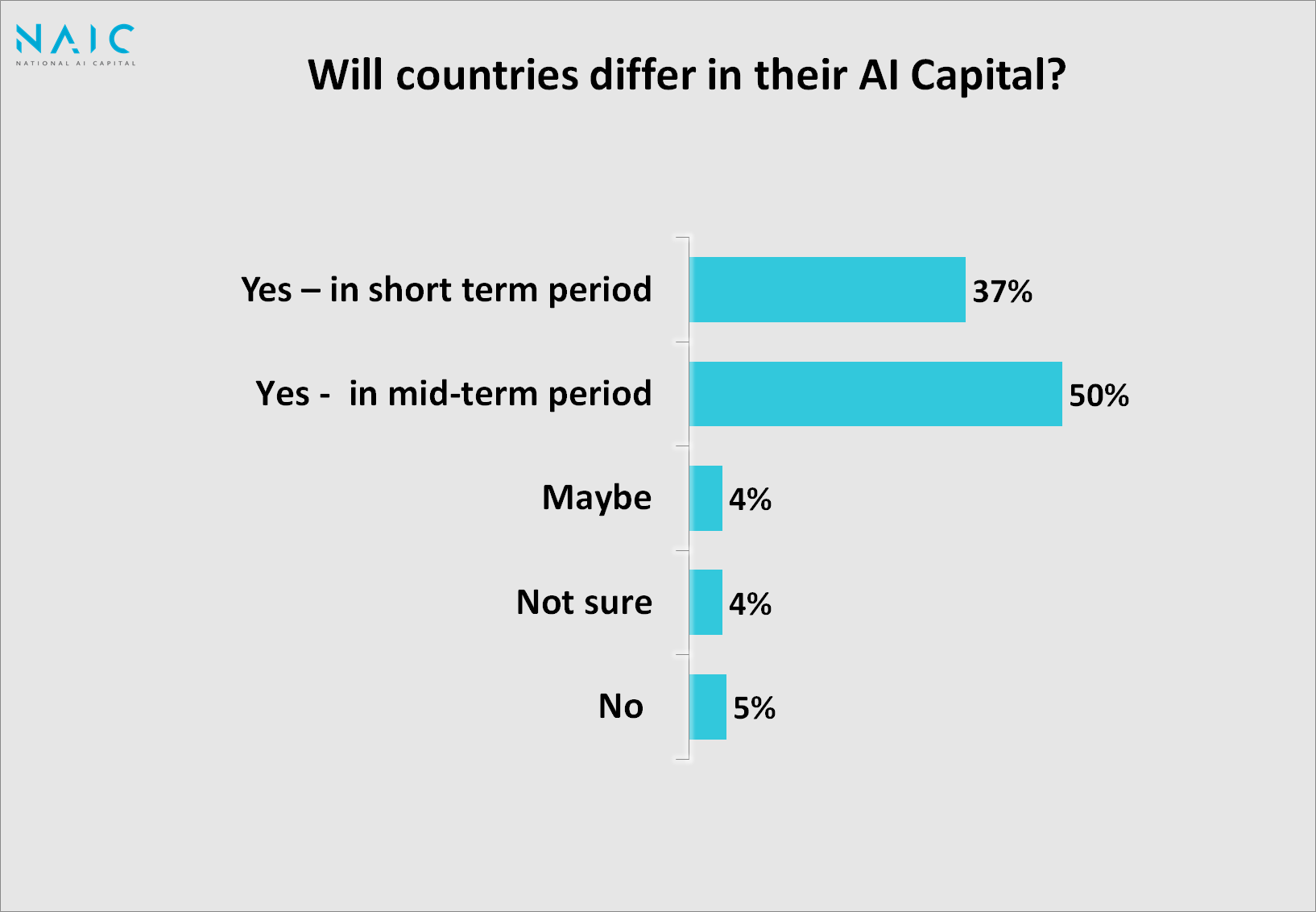
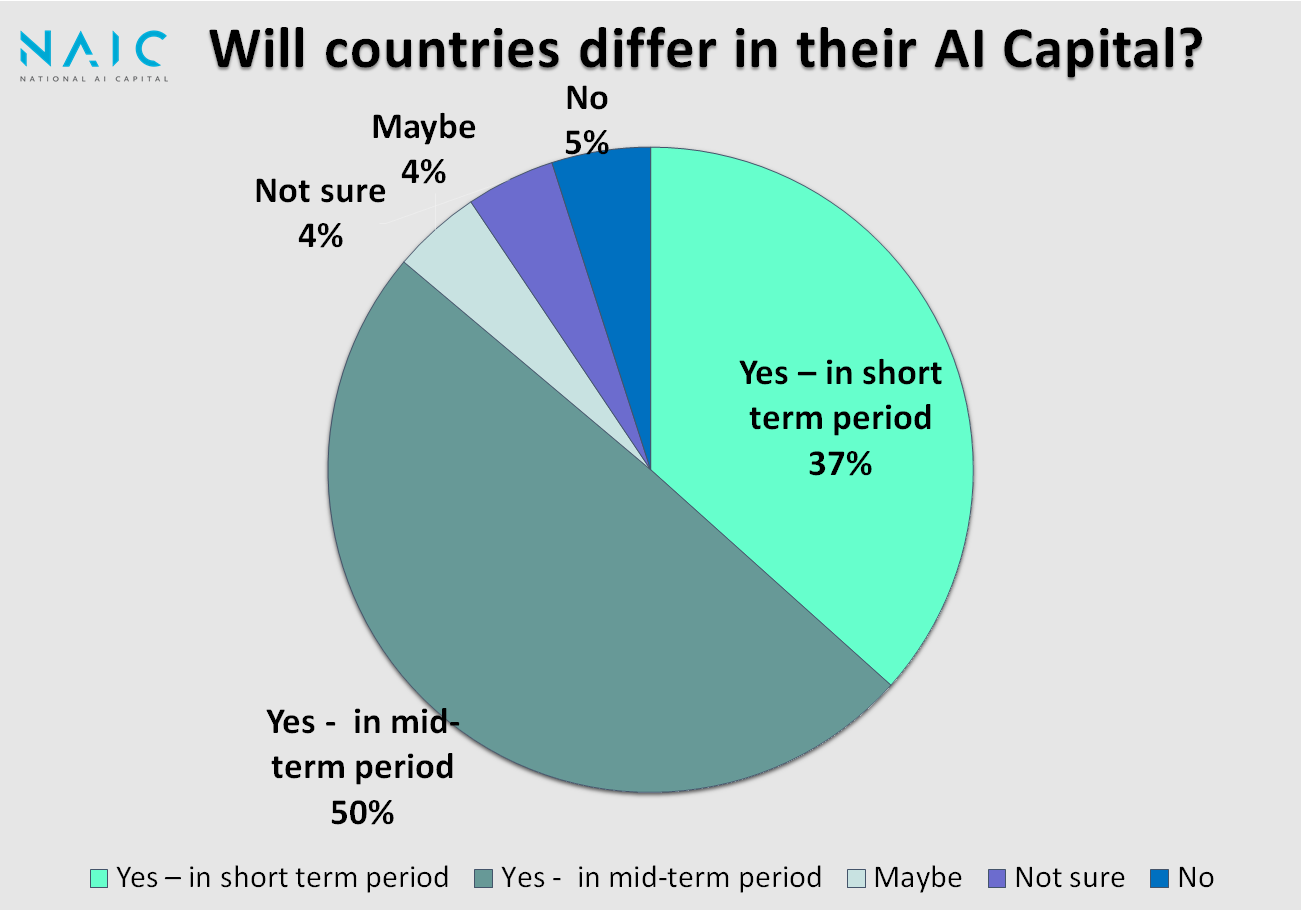
Some countries are already warned that they should react on time to remain competitive — as Microsoft warns UK. What is happening to other countries that don’t have any expectations?
The speed of change could be going faster than we experienced so far, thus making it harder to predict. So the second connected question is, who is creating, or even better who will be responsible for the creation of AI capital (products, processes, patents, knowledge, etc.) in the future. And we got very interesting predictions/answers to that question.
The biggest number of responders — 77%, predicts that the largest contribution will come from those who are leading advancements in the AI field today — private companies and corporations. Maybe a bit surprisingly, the general notion all around the world, is that a significant contribution will come from a growing number of AI start-ups — 73%. Another significant contributor could be Universities and Academic institutions — that are chosen by 59% of responders. And as the least probable contributor — responders choose — Government institutions, with only 31%.
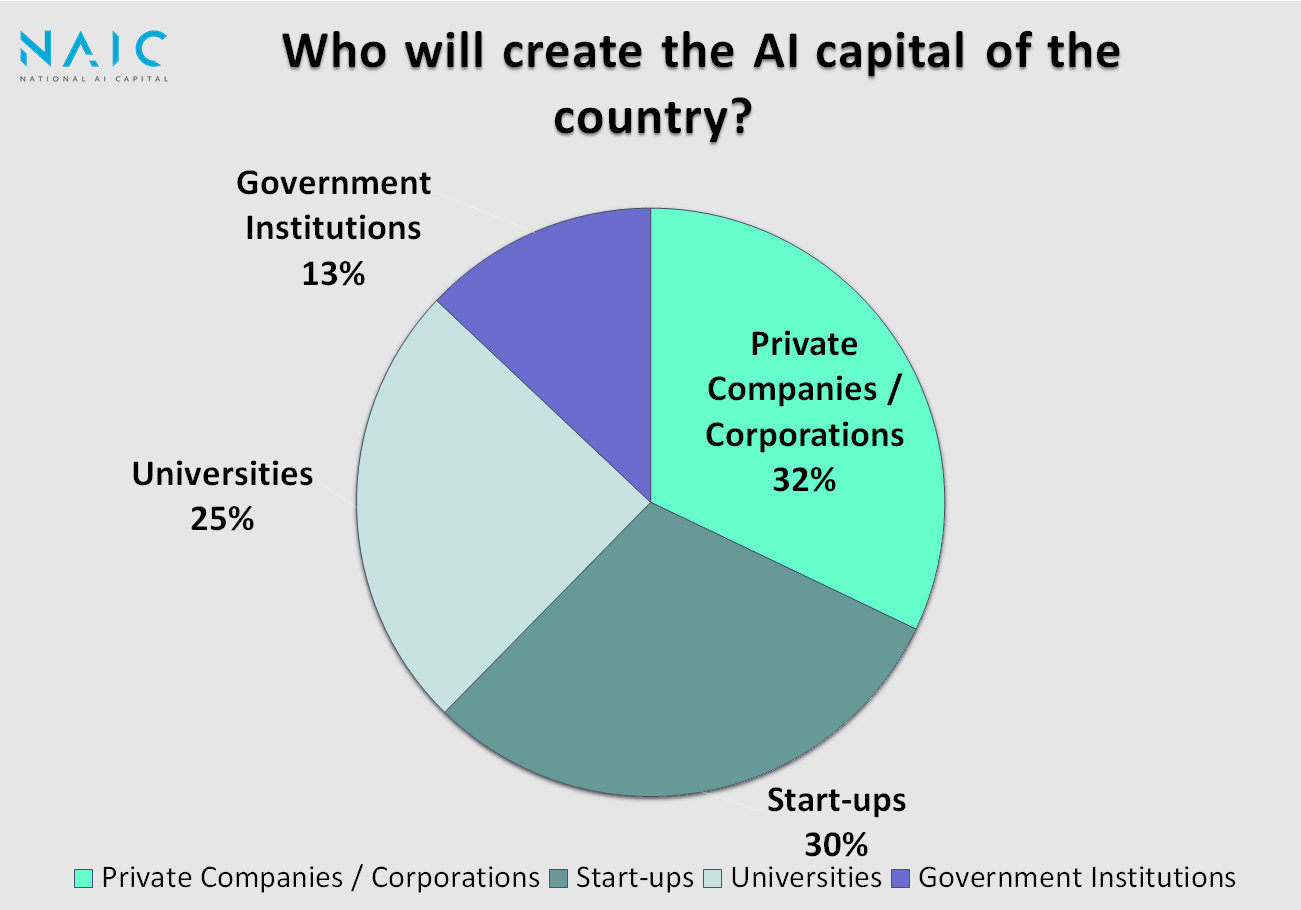
In the time when it seems AI is shaped by nine companies (from two countries), we should pause for a second and consider all the consequences of that. As a part of the answer, new AI start-ups are emerging and boosted by their speed and agility, and focus, they could disrupt the area. Unless of course, they are not bought by those giants, when the time comes. Universities are a constant and reliable player in the field of any advancement and innovation, but it seems they are also lagging, behind, and changing their leading role to support function in many cases. And, for me, the biggest problem, and for many reasons, unused potential – are government-connected institutions, capable of doing large scale projects. Current experience is that they are 4th player and not too reliable when it comes to the creation and implementation of AI. Knowing historically that most of the major breakthroughs, were achieved as a part of state-funded strategical projects, this definitely raises many concerns. AI will also become the area where power is shifting from the public to the private sector, with all the good and the bad consequences.
In conclusion, the questions mentioned here, open many subtopics. What will be the relationship between Universities, Corporations, and Government? How it will change and influence different aspects of ethics? Is confidence and hope in the power of start-ups (un)realistic, taking under consideration that currently a huge proportion of already risky start-ups, in the AI field, is not succeeding and delivering their promises? What should be the priority of our focus, taking into account that we probably have less time than most of the world would estimate?
In the third part of NAIC IGS, we will discuss data gathered on the areas of AI that are getting investments currently, and where should investments go in the future.
A new institution that has joined the NAIC Project is Visio - Scientific and Technological Institute.
Confirmation of the definition of National AI Capital and its importance was first the phase of the project. In this part, we established a probable timeline of AI development and the sources of its creation. In the second phase, we will work on segments of methodology and refining the concept.
COOPERATION: For the second phase we will enlarge the number of
academic institutions,
AI/tech associations,
companies that are willing to sponsor/participate and contribute
media who will become partners will get new data and articles first
If you are interested in collaboration, in any of those segments – contact me on This email address is being protected from spambots. You need JavaScript enabled to view it.
Donations
If you want to support further this project and share your enthusiasm, be free to donate symbolic amounts of Ethereum (ETH) to this address: 0x29e574B5A65e1d7De2B177b53996A26A6729514F


